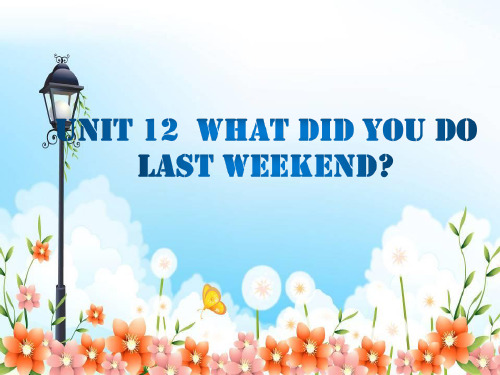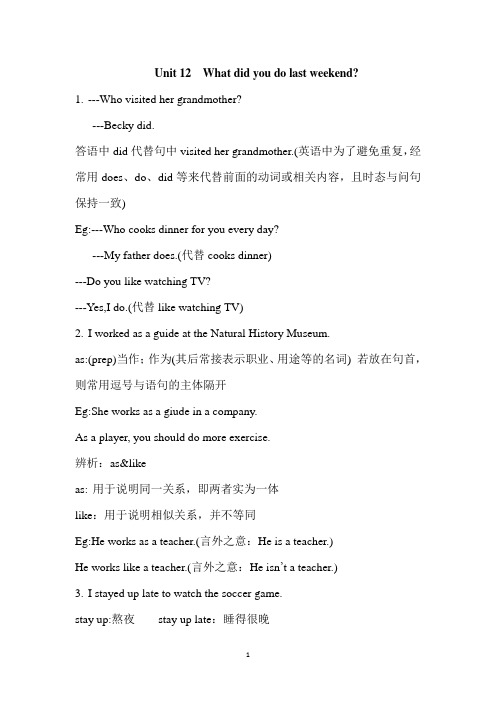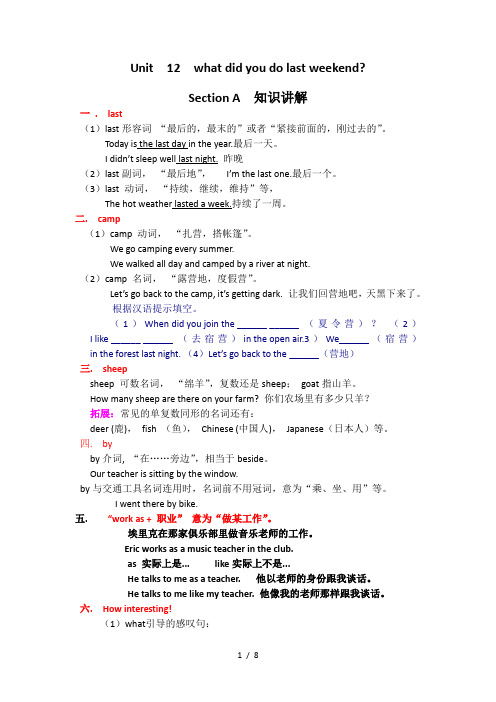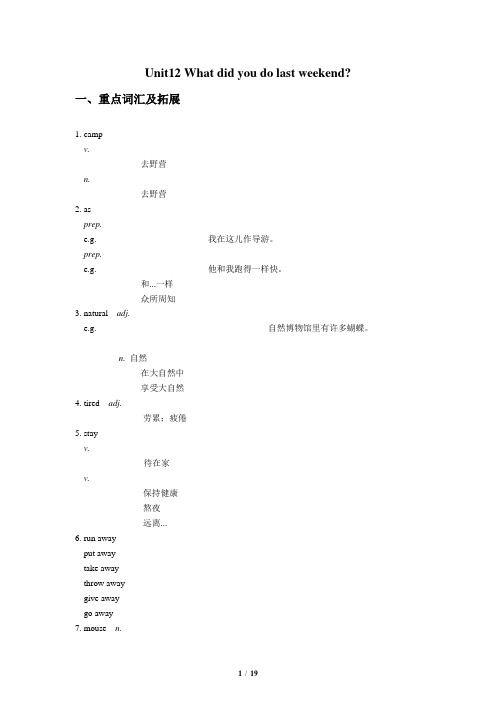人教英语七年级下册Unit 12 What did you do last weekend课件
- 格式:ppt
- 大小:310.00 KB
- 文档页数:10


Unit 12 What did you do last weekend?1.---Who visited her grandmother?---Becky did.答语中did代替句中visited her grandmother.(英语中为了避免重复,经常用does、do、did等来代替前面的动词或相关内容,且时态与问句保持一致)Eg:---Who cooks dinner for you every day?---My father does.(代替cooks dinner)---Do you like watching TV?---Yes,I do.(代替like watching TV)2.I worked as a guide at the Natural History Museum.as:(prep)当作;作为(其后常接表示职业、用途等的名词) 若放在句首,则常用逗号与语句的主体隔开Eg:She works as a giude in a company.As a player, you should do more exercise.辨析:as&likeas: 用于说明同一关系,即两者实为一体like:用于说明相似关系,并不等同Eg:He works as a teacher.(言外之意:He is a teacher.)He works like a teacher.(言外之意:He isn’t a teacher.)3.I stayed up late to watch the soccer game.stay up:熬夜stay up late:睡得很晚与stay相关的常见短语:stay at home待在家里stay away from远离stay healthy保持健康stay out 待在外面与up相关的短语call up 打电话catch up with 赶上come up with提出get up 起床give up放弃grow up 成长look up 向上看;查出make up编造;构成pick up 捡起;中途载人put up 举起;张贴set up 创建show up出现take up 占据turn up调大use up用完;耗尽4.Father mouse shouted at the cat, “Woof,woof.”辨析:shout at &shout toShout at:冲...大声叫喊(多指因生气/愤怒冲某人叫喊)Eg: He loses his temper and shouts at me.shout to:对...大声叫喊(无恶意,多因距离远)Eg: : “Can you hear me?”he shouts to Tom.5.“Well,son,that’s why it’s important to learn a second language.”(1)that’s why...这就是...的原因why引导的名词性从句在句中作表语Eg:That’s why I can pass the important exam,because I study hard. that’s because...那是因为...(表示原因)Eg:He didn’t go to school trip. That’s because he was badly ill.6.flew a kite 放风筝flew为fly的过去式fly的用法:(vi)(1)fly to乘/坐飞机=go (to)...by plane/airEg:She will fly to New York. She will go to New York by plane/air.(2)飞Eg:He hopes he can fly like a bird.(3)飞逝Eg:How time flies! (时光飞逝)(4)苍蝇Eg:Look! A fly is swimming in the porridge.7.There we put up our tents and made a fire to keep us warm and cook food on.(1)put up:搭建;张贴(动副结构)(2)keep的用法Keep sb./sth.+adj 让某人/某物保持...(强调某种状态)Eg:The coat will keep you warm.The students should keep the classroom clean.Keep sb./sth.+doing 让某人/某物一直...(强调动作的持续性)Eg:I’m sorry I’ve kept you waiting.8.The next morning,my sister and I got a terrible surprise.get a surprise 吃惊(可数名词)surprise:(不可数名词)in surprise惊奇地;惊讶地To one’s surprise 令某人惊讶的是(vt)使吃惊;使惊奇(adj)surprising surprisedEg:Her idea surprises me.9.I was so scared that I couldn’t move.(1)so...that...如此...以致于... (so后接adj/adv)Eg:The box is so heavy that I can’t carry it.He runs so fast that I can’t catch up with him.拓展:such+a/an+adj+单数可数名词+that...相当于so+adj+a/an +单数可数名词+that...Eg:Mr. Yi is such a kind teacher that we all like him. Mr. Yi is so kind a teacher that we all like him.(2)scared:惊慌的;吓坏了的=afraidbe scared of sth. 害怕做某事be scared to do sth.害怕做某事Eg:Miss Zhang is scared/afraid of the ghost.The little boy is scared/afraid to read in fornt of the others.10.感叹句(what/how )。

七年级英语下册Unit12Whatdidyoudolastweekend高频考点知识梳理单选题1、What ________ news it is! Everyone is ________ because they can get the tickets to the basketball match for free o n the Internet.A.surprise; surprisedB.surprising; surprisedC.surprised; surprisingD.surprising; surprise答案:B句意:这是多么令人惊讶的消息啊!每个人都很惊讶,因为他们可以在网上免费获得篮球比赛的门票。
考查形容词的用法。
surprise意想不到(或突然)的事,令人惊奇的事;surprised惊讶的;surprising令人吃惊的。
根据“What…news it is! ”可知,本句为感叹句,使用形容词surprising作定语修饰名词news;根据“Everyone is”可知,此处描述人的感受,使用形容词surprised作表语。
故选B。
2、I saw Tom ________ with a dog when I walked past his house yesterday.A.is playingB.to playC.playsD.playing答案:D句意:昨天我路过汤姆家时,看见他在和狗玩。
考查非谓语动词。
根据“I saw Tom…with a dog when I walked past his house yesterday.”可知,see sb. doing sth.“看见某人正在做某事”。
故选D。
3、Look at Uncle Liang’s new car. I wonder when he ________ it.A.buyB.buysC.boughtD.will buy答案:C句意:看梁叔叔的新车。

Unit 12 What did you do last weekend 一、基础归纳【教材内容解析】Section A1.camped by the lake (P. 67)camp此处用作动词,表示“扎营、搭帐篷”,常用的短语为:go camping“去野营”;camp out“野营、露营”。
Where did you camp last night?They often go camping during summer holidays.The students love camping out during summer holidays.2.I worked as a guide at the Natural History Museum. (P. 68)as此处用作介词,表示“作为、当作”,后接表示职业的名词。
He works as an actor. As a student, you should study hard.3.How interesting! (P. 68)how引导的感叹句的结构为“How+形容词/副词+主语+谓语”。
How beautiful the bird is! How fast Mary runs!【拓展】what引导的感叹句常用的结构有:“What+a/an+形容词+单数可数名词+主语+谓语”或者“What+形容词+可数名词复数/不可数名词+主语+谓语”。
What a beautiful flower! What interesting books these are! What heavy snow it is!4.I told the visitors about them and their living habits. (P. 68)tell sb. about sth.意为“告诉某人关于某事”。
Mary told me about her pet dog. 5....but I’m kind of tired now. (P. 68)kind of表示“有点儿”,相当于a little。

Unit 12 what did you do last weekend?Section A 知识讲解一. last(1)last形容词“最后的,最末的”或者“紧接前面的,刚过去的”。
Today is the last day in the year.最后一天。
I didn’t sleep well last night. 昨晚(2)last副词,“最后地”,I’m the last one.最后一个。
(3)last 动词,“持续,继续,维持”等,The hot weather lasted a week.持续了一周。
二. camp(1)camp 动词,“扎营,搭帐篷”。
We go camping every summer.We walked all day and camped by a river at night.(2)camp 名词,“露营地,度假营”。
Let’s go back to the camp, it’s getting dark. 让我们回营地吧,天黑下来了。
根据汉语提示填空。
(1)When did you join the ______ ______ (夏令营)?(2)I like ______ ______ (去宿营)in the open air.3)We______(宿营)in the forest last night. (4)Let’s go back to the ______(营地)三. sheepsheep 可数名词,“绵羊”,复数还是sheep;goat指山羊。
How many sheep are there on your farm? 你们农场里有多少只羊?拓展:常见的单复数同形的名词还有:deer (鹿),fish (鱼),Chinese (中国人),Japanese(日本人)等。
四. byby介词, “在……旁边”,相当于beside。
Our teacher is sitting by the window.by与交通工具名词连用时,名词前不用冠词,意为“乘、坐、用”等。

Unit12 What did you do last weekend?一、重点词汇及拓展1. campv. __________________ 去野营n. __________________ 去野营2. asprep. ______e.g. ________________________ 我在这儿作导游。
prep. ______e.g. ________________________ 他和我跑得一样快。
____________ 和...一样____________ 众所周知3. natural adj. ______e.g. ____________________________________自然博物馆里有许多蝴蝶。
______ n. 自然____________ 在大自然中____________ 享受大自然4. tired adj.__________________劳累;疲倦5. stayv.__________________待在家v.__________________保持健康____________熬夜____________远离...6. run away ______put away ______take away ______throw away ______give away ______go away ______7. mouse n.______复数:______8. shout v.____________呼喊...______朝...喊叫(带有情绪)9. language n.____________身体语言____________语言的美____________第二语言10. flyv.______e.g. ____________________________________他们在湖边放风筝。
____________飞去某地n.______e.g. __________________ 我讨厌苍蝇。
Unit 12 What did you do last weekend?【短语归纳】1.do my homework 做作业2.go to the cinema 去看电影3.go boating 去划船4.by the lake 在湖边5.go to the beach 去海滩6.play badminton 打羽毛球7.visit my grandma 看望我奶奶8.study for the English test 为英语测验而学习备考9.the Natural History Museum 自然历史博物馆10. kind of 有点儿11.stay up 深夜不睡,熬夜12. give back 归还13.be afraid 害怕14. play the guitar 弹吉他15.go to the library 去图书馆16. in a swimming pool 在游泳池里17. shout at… 冲……大声叫嚷18. high school 高中,中学19.fly kites 放风筝、20. go camping 去野营21.put up 搭建22 .make a fire 生火23.tell stories 讲故事24 .each other 互相25.go to sleep 入睡26.get a surprise 吃惊27.shout to… 呼喊……喊叫…… 28.up and down 来来回回;上上下下29.wake…up 把……弄醒30.do my homework 做我的家庭作业31.on Saturday morning 在星期六早上32.have a good weekend 周末过得愉快33.the next morning 第二天早上34.work as 以……身份而工作35.run away 跑开36.move into … 移进……【用法集萃】1. go + doing 去做某事2. play + 球类玩……球3. 时间段+ ago ……前4. keep + sb. / sth. + 形容词/ 副词/ 介词短语使……保持……5. so + 形容词/ 副词+ that 句子如此……以至于……6. see sb. doing sth. 看见某人正在做某事7. let sb. do sth. 让某人做某事8. start to do / doing sth. 开始做某事【经典范文】I had a busy weekend. On Saturday morning, I did my homework, and then I played computer games. In the afternoon, I visited my grandmother. We talked for a long time.On Sunday morning, I cleaned my room and did some reading. Then I cooked for m parents. In the afternoon, I watched a football match on TV and listened to music. I had a good time.知识点解析1. 表示““过去”的时间。
Unit 12 What did you do last weekend?Section A, 1bBob: Hey, Lucy.你好,露西。
Lucy: Hi, Bob.你好,鲍勃。
Bob: How was your weekend?周末过得怎么样?Lucy: It was great.很好。
Bob: So, what did you do?那你都做什么了?Lucy: Well, on Saturday morning, I played badminton. In the afternoon, I went to the beach, and at night, I went to the cinema.周六上午我打了羽毛球,下午我去了沙滩,晚上去看了电影。
Bob: Cool. What about Sunday?不错。
周日呢?Lucy: In the morning, I camped by the lake with my classmates. In the afternoon, we went boating, and at night, I did my homework.上午我和同学在湖边露营。
下午,我们去划船,然后晚上我做了作业。
Section A, 2a, 2bTeacher: So, did everyone have a good weekend?大家周末过得好吗?Students: Yeah, we did, Ms. Clark!是的,很好,克拉克女士!Teacher: Good. What did you do last weekend, Becky?很好。
贝姬,上周末你做什么了?Becky: I visited my grandma, and I did my homework.我去看我祖母,然后做了作业。
Teacher: Great. And how about you, Carol?不错。